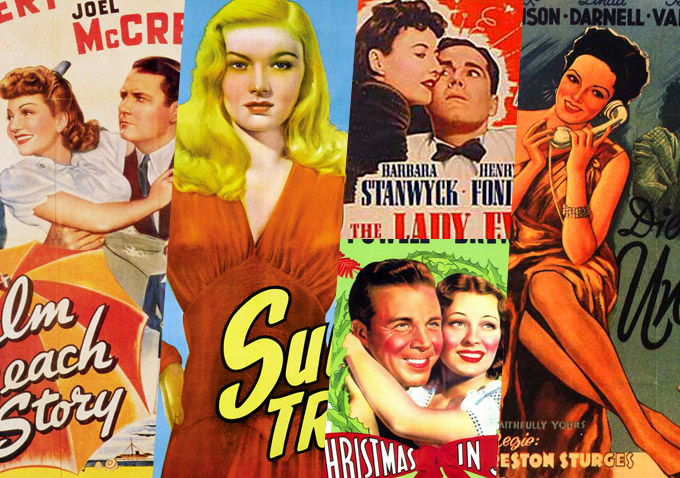
“Sullivan’s Travels” (1941)
Sturges’ influence can be found all over modern film, especially in any strain of comedy that prizes a non-conformist approach to story structure, but nowhere has this influence been more openly acknowledged than by the Coen Brothers, and no Sturges film had a greater evident impact on them than “Sullivan’s Travels”. You can see its traces in Barton Fink’s desire to write something “important” while being entirely unaware of the implicit condescension of his position toward “the little guy,” which is a pretty close mirroring of the attitude of the successful film director Sullivan (Joel McCrea). And you can see it as well in the Coens’ having lifted the title “O Brother, Where Art Thou” from Sullivan’s dream film project. But even more than these surface similarities, what the Coens and other Sturges admirers so adore and what can be found best exemplified in “Sullivan’s Travels” are Sturges’ lightning-fast shifts in tone, from broad, daft comedy to verbal wit to high drama to biting satire. As Sully embarks on his quixotic and self-consciously noble journey to discover what it’s really like to be poor and obscure and desperate, the film glints with every color of the spectrum —there’s real pathos in the moments that the scales fall from his eyes; real peril in how he ends up on a chain gang; real Hollywood insider irony in the band of publicists who follow him and report on his quest; and real spark in the understated love story that springs up between him and an utterly beguiling Veronica Lake, never so appealing and Girl Friday-ish as here. Sturges could occasionally be too clever for his own good, leading to his satirical instincts becoming scattershot and unfocused, with his films becoming so diffuse that there’s no way to really tell what they are being so delightfully scornful toward. But this is the most perfect of his films, perhaps because most unusually for Sturges, it has a focus and a moral that feels thoroughly earned and satisfying as Sully realises the value in simply making people laugh and jettisons his “message”-laden magnum opus for the riotous comedies that made his name. Of course, if Sully had been Sturges, he could have simply done both those things at the same time and made “Sullivan’s Travels.”

“The Palm Beach Story” (1942)
If Sturges is erroneously associated with the champagne/cocktail dress upper class romantic farce genre today, it’s undoubtedly down to “The Lady Eve” and this less well-known but equally delightful, ridiculous, wonky confection. Absent almost all of the social conscience that would crop up in unexpected places elsewhere in his filmography and more of an acerbic character piece than a satire, “The Palm Beach Story” is perhaps the lightest, frothiest mousse-dessert of a film that Sturges would ever make. Starring an effervescently charming Claudette Colbert in some awesome frocks, Joel McCrea as her struggling architect husband, Sturges regular Rudy Vallee and “The Maltese Falcon“‘s Mary Astor, here neither the story nor any of the characters’ behaviors make a lick of sense…and who the hell cares. Tom and Gerry (!) are married and obviously in love, but Gerry (Colbert), sick of having so little money, decides she’s the wrong sort of wife for Tom and takes off for Palm Beach to get a divorce and meet a millionaire. Of course, she meets about ten, becoming the pet to a whole club of drunken captains of industry on the train to Florida, and eventually retreats into a meet-cute with an unassuming-seeming chap who just turns out to be the Rockefeller-esque John D. Hackensacker (Vallee). Naturellement, h e falls for her, so when Tom turns up to win her back, she pretends he is her brother and everyone goes along with it because… look, let’s not analyse any of this too closely, eh? Again, part of Sturges’ consummate skill is in getting coherent and often truly brilliant comic performances out of a cast whose characters bounce from one contrivance to the next coincidence like so many star-cross’d pinballs. If you don’t believe me, simply consider this: the film opens with an unexplained scene of Colbert in her undies tied up in a closet while Colbert (again) dashes to the church in a wedding dress to be married to McCrea, and at its close it’s revealed she has an identical twin. So… wait, what? Gerry married Tom under false pretenses of being her own twin and maintained that illusion for eight years or so? Only Sturges could make a film that seems like it has an entire act missing and somehow make it feel churlish to even point that out.






Tom has a twin too in Palm Beach Story, not just Gerry. It hilariously makes everything neatly tie up at the end with a triple wedding. That\’s my favorite Sturges movie. So good!
Yeah, definitely one of my favorite directors from the golden age of Hollywood, with The Lady Eve, The Great McGinty, and Sullivan\’s Travels my top three.
It\’s bred in the bean.
I adore Preston Sturges. But I don\’t want to be a hero!
\’The Sins of Harold Diddlebock\’ or \’Mad Wednesday\’ is so woefully underappreciated, I had to pipe in to sing its praise. Seek this film out and see some classic Sturges bits on love and drinking!